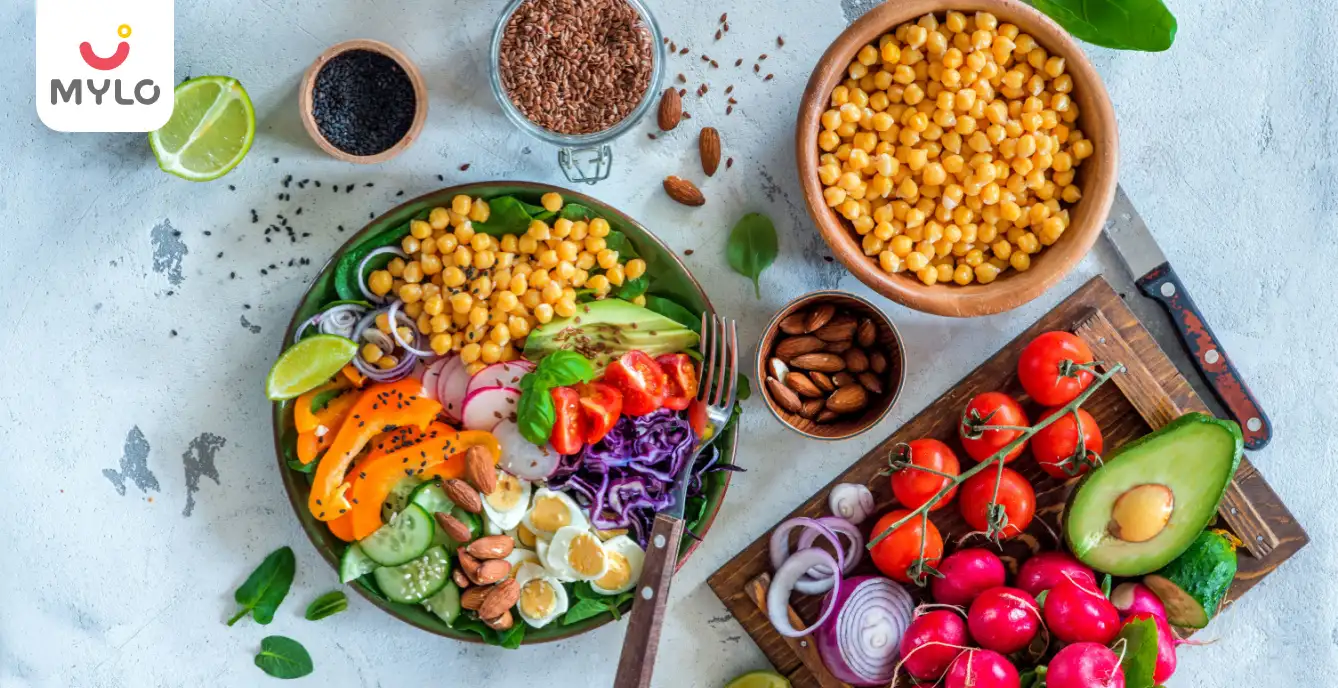Home

What Are the Essential Tips for Breastfeeding Mothers to Have a Healthy Diet Plan?
In this Article

From the Nutritionist
What Are the Essential Tips for Breastfeeding Mothers to Have a Healthy Diet Plan?
Updated on 4 February 2026



Medically Reviewed by
Dt. Mansi Goyal
Specializes in Critical Gestational Diabetes, PCOS Patients - BSC| MSC (Home Science, Food & Nutrition)
View Profile

Motherhood comes with not just immense happiness but lots of responsibilities as well. One of those responsibilities is breastfeeding. Breastfeeding not only fills your baby’s tummy but is very good for your health as well. The whole process of feeding your child strengthens the bond between you and your baby!
Breastfeeding is the most important thing for a child's health, and growth as a newborn depends entirely on the mother's milk. A breastfeeding mother needs to take a proper diet at the appropriate time.
The benefits of breast milk are enormous. A baby in the initial stage gets all the nutrition from a mother's breast milk, and what a mother eats directly affects the quality of the breast milk. This makes it extremely important for a mother to take a proper and healthy diet to feed her baby properly and provide them with healthy and nutritious feed. Consuming lactation supplements like lactomama lactation granules, helps improve breast milk supply in new mothers.
Also read: What to eat and what to avoid while Breastfeeding your baby?
Tips for a healthy diet plan for breastfeeding mothers:
When you're breastfeeding, always remember that your baby gets the best when you eat the best. You need to remember many things when you plan your diet during pregnancy. Eating a healthy diet and maintaining a healthy routine is not just good for your baby but for you as well. Let us discuss a few tips that will help you maintain a healthy diet while breastfeeding.
1. Maintain A Balanced Diet
Maintaining a balanced diet is highly critical. Try to have at least three whole meals a day. You can also eat healthy snacks between or divide your day into six smaller meals, whatever works the best for you. Ensure that you include whole grains in your diet as they are full of essential vitamins, minerals, and fibre. These include oats, wheat, barley, and millets. You can also make fresh fruits and lean proteins a part of your breastfeeding diet, as they will help you control the urge to eat junk food.
Nuts and seeds can be enjoyed as a snack on their own or added to a mother's breakfast cereal. These foods are packed with proteins, vitamins, minerals, antioxidants, healthy fats, and fibre. The fibre in nuts and seeds keeps the stomach satiated and suppresses appetite.
2. Say Yes To Green Leafy Vegetables
There is no doubt that green leafy vegetables are indeed an excellent food during breastfeeding. It is also one of the foods to increase breast milk. Green leafy vegetables like spinach, cabbage, and Fenugreek are rich in fibre, calcium, and vitamin A, C, E, and K. These green leafy vegetables are nutrient-dense foods but low in calorific value. Therefore, every breastfeeding mother must make this a part of her diet!
Legumes and beans are the best options for vegetarian mothers. These food items are rich sources of protein needed to build muscle and help the body recover from childbirth. Legumes and beans also act as sources of fibre, phytochemicals, and several minerals.
3. Drink Enough Water
Including fluids from fruits, vegetables, and other foods, aim to consume eight cups of water or more each day. It is especially beneficial during the first few weeks following childbirth when your body is still recovering.
You should drink one cup of water every time you nurse your baby to ensure you're receiving enough. During breastfeeding, your daily hydration requirement is approximately one hundred and eighty-four ounces from all sources (so don't stress about downing 16 glasses of water every day!). Your specific needs will vary based on various factors, including how often you breastfeed, how active you are, and even the climate.
Remember that unless you're very dehydrated, your breast milk production won't be harmed, but your urine will get darker and scantier. Constipation, tiredness, and urinary tract infections (UTIs) are all possible side effects of not getting enough fluids in your system when you don't drink enough. You'll be thirsty a lot when you're breastfeeding, so make sure to stay hydrated at all times.
4. Consider Taking Supplements
Taking a daily vitamin B-12 supplement is likely recommended by your doctor. Vegetarians have difficulty getting enough vitamin B-12 because it is nearly solely found in animal sources. Omega-3 supplements may be an option for those who don't consume fish on a regular basis.
Taking vitamin D supplements may be necessary if you aren't getting enough sun exposure and getting enough vitamin D-fortified foods like milk and some cereals. Vitamin D is essential for absorbing calcium and phosphorus in your baby. Vitamin D deficiency can lead to rickets, a condition that weakens and softens bones. Vitamin D supplements should be discussed with you and the doctor who will treat your child.
5. Add Fish To Your Diet
Fish is very beneficial for breastfeeding moms. It is rich in Omega-3 fatty acids that play an essential role in the baby's brain and eye development. These fats are also beneficial for new mothers as it reduces the risk of heart disease and certain types of cancer.
Like the things to be added to the diet, you should also omit many things from the diet.
Seafood low in mercury can be eaten two to three times per week without fear of ill effects, including low-mercury varieties of salmon and light canned tuna.
6. Eat Milk-Making Foods
There are plenty of foods to increase milk supply. Foods like Fenugreek seeds, green leafy vegetables, fennel seeds, sesame seeds, oatmeal, unripe papaya, carrots, brown rice, barley, bitter gourd, almonds, sweet potatoes, drumsticks, chickpea, water, milk etc. help increase breast milk supply in a huge way. After trying out all foods that can increase milk supply, if you cannot produce enough milk for your baby. The lactation consultant may ask you to consult a lactation consultant and take some lactation supplements to increase breast milk production.
7. Avoid Alcohol and Smoking
Breast milk contains no safe level of alcohol for a newborn. Breastfeeding moms should avoid breastfeeding while under the influence of alcohol. In order to drink 12 ounces (355 millilitres) of 5% beer, or 5 ounces (148 millilitres) of 12% wine, you will need between two and three hours, depending on your body weight. Consider pumping your breast milk in advance of indulging in alcoholic beverages.
Smoking can have adverse effects on the developing infant and the mother who is nursing. Smoking may affect a mother's ability to produce breast milk. Babies exposed to toxins through breast milk are more likely to be fussy, nauseous, and restless.
8. Say No To Excessive Caffeine
Tea and coffee can be almost like a necessity for many people. However, a breastfeeding mom should consume no more than one to two cups of coffee or tea per day. The total quantity of caffeine shouldn't exceed 300 milligrams a day. Of course, you will be tempted and tempted and tempted just to drink a cup extra of your favourite tea or coffee, but you must remember that consumption of caffeine in excess can be bad for your health and your baby's health as well.
In addition, it can cause you and your infant to be irritated, restless, and sleepless. Caffeine can also be found in coffee, tea, soda, and chocolate.
9. Avoid High Mercury Fish
Pregnant women and lactating mothers are subject to the same EPA standards on fish safety: Shark, orange roughy, swordfish, marlin, giant eye tuna, tilefish (Gulf of Mexico), and King mackerel are among high-mercury fish to avoid. You shouldn't consume more than 4 ounces of white albacore tuna per week and no more than 8 to 12 ounces of canned light tuna per week.
Breastfeeding is a beautiful experience. It is an ideal time for the mother and child to bond. Following the proper diet can make this experience even more beautiful and a happy experience for both your child and you as well. The best part about being a breastfeeding mother is that this experience is yours and yours alone! To make sure that you and your baby both enjoy this journey, it is very important that you take care of yourself and the food that you consume during this time.
.webp&w=1900&q=90)
Increase Breast Milk Supply with LactoMama ™ Lactation Granules - 300g - Pack of 2 | Elaichi
100% Natural Ingredients | Improves Lactation | Clinically Tested | Rich in Vitamins, Minerals, Iron & Calcium
₹ 889

4.5
(19370)


95444 Users bought





Medically Reviewed by
Dt. Mansi Goyal
Specializes in Critical Gestational Diabetes, PCOS Patients - BSC| MSC (Home Science, Food & Nutrition)
View Profile


Written by
Sanju Rathi
A Postgraduate in English Literature and a professional diploma holder in Interior Design and Display, Sanju started her career as English TGT. Always interested in writing, shetook to freelance writing to pursue her passion side by side. As a content specialist, She is actively producing and providing content in every possible niche.
Read MoreGet baby's diet chart, and growth tips

Related Articles
RECENTLY PUBLISHED ARTICLES
our most recent articles

Celebrate Breast Feeding Week
Disadvantages of Breastfeeding No One Tells You About

Breast Milk
No Breast Milk After Delivery: What to Do & What are the Factors Responsible

Diet & Nutrition for Mothers
Indian Food to Increase Breast Milk: Everything You Need to Know

Medications
Dolo 650 During Breastfeeding: Expert Advice and Guidelines for Nursing Mothers

Cold & Cough
Home Remedies for Cold During Breastfeeding: How to Keep Both Mom and Baby Healthy

Fever During Breastfeeding: Tips from Experts for New Moms
- Side Effects of Breastfeeding While Lying Down: Is It Worth the Risk?
- 17 Foods to Avoid While Breastfeeding: Expert Guide for New Moms
- What to Pack and What to Skip When Travelling with a Baby
- How Baby Sleep Patterns Change in the First Year and What Parents Can Do
- Choosing the Best Baby Diapers in India for a Rash-Free, Happy Baby
- What Kind of Diapers for Babies Keep The Little One's Comfortable, Dry and Happy
- Indian Food Chart for Your 10-Month-Old Baby – Week 1
- 10 Month Old Baby Food Chart/Meal Plan – Week 2
- 10 Month Old Baby Food Chart/Meal Plan – Week 3
- Indian Food Chart for Your 8-Month-Old Baby – Week 1
- Best Christian Baby Boy Names That Are Unique and Timeless 2026
- The Ultimate Collection of Girl Baby Names in Tamil 2026
- Yellow Discharge Before Period: Is It Normal or a Cause for Concern?
- Evaporation Line vs Faint Positive: The Ultimate Guide to Pregnancy Test Results


AWARDS AND RECOGNITION

Mylo wins Forbes D2C Disruptor award

Mylo wins The Economic Times Promising Brands 2022
AS SEEN IN

- Mylo Care: Effective and science-backed personal care and wellness solutions for a joyful you.
- Mylo Baby: Science-backed, gentle and effective personal care & hygiene range for your little one.
- Mylo Community: Trusted and empathetic community of 10mn+ parents and experts.
Product Categories
baby carrier | baby soap | baby wipes | stretch marks cream | baby cream | baby shampoo | baby massage oil | baby hair oil | stretch marks oil | baby body wash | baby powder | baby lotion | diaper rash cream | newborn diapers | teether | baby kajal | baby diapers | cloth diapers |




